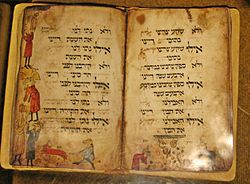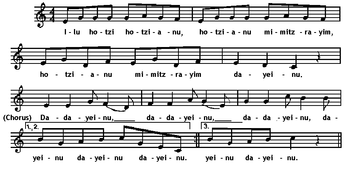- Dayenu
-
Jewish and
Israeli musicReligious Contemporary
Piyyut · Zemirot · Nigun
Pizmonim · BaqashotSecular Dance Israeli folk dancing · Ballet
Horah · Hava Nagila
Yemenite dancingIsrael Hatikvah · Jerusalem of Gold Piyyutim Adon Olam · Geshem · Lekhah Dodi
Ma'oz Tzur · Yedid Nefesh · YigdalMusic for Holidays Shabbat
Dayenu (Hebrew:דַּיֵּנוּ) is a song that is part of the Jewish holiday of Passover. The word "Dayenu" means approximately, "it would have been enough for us", "it would have been sufficient", or "it would have sufficed" (day in Hebrew is "enough", and -enu the first person plural suffix, "to us"). This traditional up-beat Passover song is over one thousand years old. The earliest full text of the song occurs in the first medieval haggadah, which is part of the ninth-century Seder Rav Amram.[1] The song is about being grateful to God for all of the gifts he gave the Jewish people, such as taking them out of slavery, giving them the Torah and Shabbat, and had God only given one of the gifts, it would have still been enough. This is to show much greater appreciation for all of them as a whole. The song appears in the haggadah after the telling of the story of the exodus and just before the explanation of Passover, matzah and the maror.
Contents
The fifteen stanzas
Dayenu has 15 stanzas representing the 15 gifts God bestowed. The first five involve freeing the Jews from slavery, the next describe the miracles He did for them, and the last five for the closeness to God He gave them. Each of the stanzas is followed by the word "Dayenu" (it would have been enough) sung repeatedly. The 15 stanzas are as follows:
Five Stanzas of Leaving Slavery
1) If He had brought us out of Egypt.
2) If He had executed justice upon the Egyptians.
3) If He had executed justice upon their gods.
4) If He had slain their first born.
5) If He had given to us their health and wealth.Five Stanzas of Miracles
6) If He had split the sea for us.
7) If He had led us through on dry land.
8) If He had drowned our oppressors.
9) If He had provided for our needs in the wilderness for 40 years.
10) If He had fed us manna.Five Stanzas of Being With God
11) If He had given us Shabbat.
12) If He had led us to Mount Sinai.
13) If He had given us the Torah.
14) If He had brought us into the Land of Israel.
15) If He built the Temple for us.Text
English translation Transliteration Hebrew Verse 1: If He had brought us out from Egypt, Ilu hotzianu mimitzrayim, אִלּוּ הוֹצִיאָנוּ מִמִּצְרָיִם and had not carried out judgments against them v'lo asah bahem sh'fatim, וְלֹא עָשָׂה בָּהֶם שְׁפָטִים — Dayenu, it would have sufficed! dayeinu! דַּיֵּנוּ Verse 2: If He had carried out judgments against them, Ilu asah bahem sh'fatim אִלּוּ עָשָׂה בָּהֶם שְׁפָטִים and not against their idols v'lo asah be'eloheihem, וְלֹא עָשָׂה בֶּאֱלֹהֵיהֶם — Dayenu, it would have sufficed! dayeinu! דַּיֵּנוּ Verse 3: If He had destroyed their idols, Ilu asah be'eloheihem, אִלּוּ עָשָׂה בֶּאֱלֹהֵיהֶם and had not smitten their first-born v'lo harag et b'choreihem, וְלֹא הָרַג אֶת בְּכוֹרֵיהֶם — Dayenu, it would have sufficed! dayeinu! דַּיֵּנוּ Verse 4: If He had smitten their first-born, Ilu harag et b'choreihem, אִלּוּ הָרַג אֶת בְּכוֹרֵיהֶם and had not given us their wealth v'lo natan lanu et mamonam, וְלֹא נָתַן לָנוּ אֶת מָמוֹנָם — Dayenu, it would have sufficed! dayeinu! דַּיֵּנוּ Verse 5: If He had given us their wealth, Ilu natan lanu et mamonam, אִלּוּ נָתַן לָנוּ אֶת מָמוֹנָם and had not split the sea for us v'lo kara lanu et hayam, ןלא קָרַע לָנוּ אֶת הַיָּם — Dayenu, it would have sufficed! dayeinu! דַּיֵּנוּ Verse 6: If He had split the sea for us, Ilu kara lanu et hayam, אִלּוּ קָרַע לָנוּ אֶת הַיָּם and had not taken us through it on dry land v'lo he'eviranu v'tocho becharavah, וְלֹא הֶעֱבִירָנוּ בְּתוֹכוֹ בַּחָרְבָּה — Dayenu, it would have sufficed! dayeinu! דַּיֵּנוּ Verse 7: If He had taken us through the sea on dry land, Ilu he'eviranu v'tocho becharavah, אִלּוּ הֶעֱבִירָנוּ בְּתוֹכוֹ בַּחָרְבָּה and had not drowned our oppressors in it v'lo shika tzareinu b'tocho, וְלֹא שָׁקַע צָרֵינוּ בְּתוֹכוֹ — Dayenu, it would have sufficed! dayeinu! דַּיֵּנוּ Verse 8: If He had drowned our oppressors in it, Ilu shika tzareinu b'tocho, אִלּוּ שֶׁקַע צָרֵינוּ בְּתוֹכוֹ and had not supplied our needs in the desert for forty years v'lo sipeik tzorkeinu bamidbar arba'im shana, וְלֹא סָפַק צָרַכְנוּ בַּמִּדְבָּר אַרְבָּעִים שָׁנָה — Dayenu, it would have sufficed! dayeinu! דַּיֵּנוּ Verse 9: If He had supplied our needs in the desert for forty years, Ilu sipeik tzorkeinu bamidbar arba'im shana, אִלּוּ סְפֵק צְרָכֵינוּ בַּמִּדְבָּר אַרְבָּעִים שָׁנָה and had not fed us the manna v'lo he'echilanu et haman, וְלֹא הֶאֱכִילָנוּ אֶת הַמָּן — Dayenu, it would have sufficed! dayeinu! דַּיֵּנוּ Verse 10: If He had fed us the manna, Ilu he'echilanu et haman, אִלּוּ הֶאֱכִילָנוּ אֶת הַמָּן and had not given us the Shabbat v'lo natan lanu et hashabbat, וְלֹא נָתַן לָנוּ אֶת הַשַּׁבָּת — Dayenu, it would have sufficed! dayeinu! דַּיֵּנוּ Verse 11: If He had given us the Shabbat,
Ilu natan lanu et hashabbat, אִלּוּ נָתַן לָנוּ אֶת הַשַּׁבָּת and had not brought us before Mount Sinai v'lo keirvanu lifnei har sinai, וְלֹא קָרַבְנוּ לִפְנֵי הַר סִינִי — Dayenu, it would have sufficed! dayeinu! דַּיֵּנוּ Verse 12: If He had brought us before Mount Sinai, Ilu keirvanu lifnei har sinai, אִלּוּ קָרַבְנוּ לִפְנֵי הַר סִינִי and had not given us the Torah v'lo natan lanu et hatorah, וְלֹא נָתַן לָנוּ אֶת הַתּוֹרָה — Dayenu, it would have sufficed! dayeinu! דַּיֵּנוּ Verse 13: If He had given us the Torah, Ilu natan lanu et hatorah, אִלּוּ נָתַן לָנוּ אֶת הַתּוֹרָה and had not brought us into the land of Israel v'lo hichnisanu l'eretz yisra'eil, וְלֹא הִכְנִיסָנוּ לְאֶרֶץ יִשְׂרָאֵל — Dayenu, it would have sufficed! dayeinu! דַּיֵּנוּ Verse 14: If He had brought us into the land of Israel, Ilu hichnisanu l'eretz yisra'eil, אִלּוּ הִכְנִיסָנוּ לְאֶרֶץ יִשְׂרָאֵל and not built for us the Holy Temple
v'lo vanah lanu et beit hamikdash, וְלֹא בָּנָה לָנוּ אֶת בֵּית הַמִּקְדָּשׁ — Dayenu, it would have sufficed! dayeinu! דַּיֵּנוּ Customs associated with Dayenu
Jews in Afghanistan and Iran hit each other over the head with green onions during the refrain beginning with the ninth stanza (Even if you had supplied our needs in the desert for 40 years but not provided us with manna). This may be due to a passage in Numbers 11:5-6, where the Israelites see manna and recall Egypt. "We remember the fish that we used to eat in Egypt, the cucumbers, the melons, the leeks, the onions and the garlic. Now our gullets are shriveled. There is nothing at all. Nothing but this manna to look at." It is thought that by beating each other with the onions they taught themselves not to yearn for Egypt or to forget Egyptian Bondage.[2]
Trivia
- Ben Kweller adopts the word "Dayenu" in the song Lizzy on his album Sha Sha.
On his website he writes: "Dienu is like an old folk word that's Hebrew and it means 'it would have been enough'... when something good happens to you and then another good thing happens to you. What you had in the first place would have been enough, if nothing else happens to you. It's all about counting your blessings and staying grounded."
References
- ^ Folktales of the Jews: Tales from Eastern Europe: Vol. II (Jewish Publication Society of America, 2007), p.383
- ^ "Strange Customs - A Different Night Activity Center". http://www.jafi.org.il/education/hartman/customs.html.
External links
Passover • פֶּסַח Seder Haggadah - Adir Hu
- Chad Gadya
- Dayenu
- Echad Mi Yodea
IllustrationsPassover foods Matzah productsMatzah companiesReligious ObservancesLaws/CustomsPrayers- Song of Songs
- Torah readings
- Prayer for dew
Categories:- Hebrew-language songs
- Hebrew words and phrases
- Passover songs
- List songs
Wikimedia Foundation. 2010.


